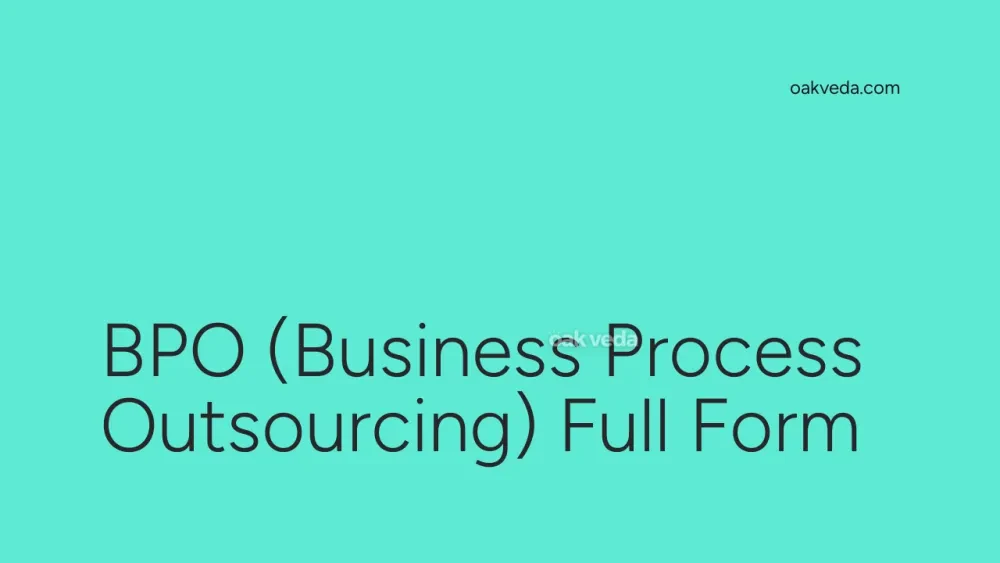
What is the Full Form of BPO?
The full form of BPO is Business Process Outsourcing. This term has become increasingly prevalent in the modern business landscape, representing a strategic approach to managing organizational operations.
What is Business Process Outsourcing?
Business Process Outsourcing, commonly known as BPO, is a business practice where an organization contracts specific work processes to a third-party service provider. This approach allows companies to focus on their core competencies while delegating non-core functions to external experts.
Origin and Development of Business Process Outsourcing
The concept of BPO emerged in the late 20th century as businesses sought ways to reduce costs and improve efficiency. Initially, it primarily involved manufacturing processes, but with the advent of digital technology and globalization, BPO expanded to include a wide range of services, from customer support to human resources management.
How does Business Process Outsourcing work?
In a BPO arrangement, a company identifies processes that can be more efficiently handled by an external provider. These processes are then contracted out to specialized firms, often in locations with lower operational costs. The BPO provider manages these processes using their expertise, technology, and resources, while the client company maintains oversight and sets performance standards.
Types of Business Process Outsourcing
BPO can be categorized based on the location of the service provider:
-
Onshore Outsourcing (Domestic Outsourcing): This involves contracting services to a provider within the same country. It offers the advantage of cultural alignment and easier communication.
-
Nearshore Outsourcing: In this model, services are outsourced to neighboring countries. It balances cost savings with geographical proximity.
-
Offshore Outsourcing: This refers to outsourcing to distant countries, often with significant cost advantages but potential challenges in time zones and cultural differences.
Functions of Business Process Outsourcing
BPO encompasses a wide range of business functions, including:
- Customer Service and Support
- Human Resources Management
- Finance and Accounting
- IT Services and Support
- Data Processing and Analytics
- Marketing and Sales Support
- Supply Chain Management
Applications of Business Process Outsourcing
BPO is utilized across various industries:
- Telecommunications: For customer support and technical assistance
- Healthcare: For medical billing and record management
- Banking and Finance: For transaction processing and risk analysis
- Retail: For inventory management and customer service
- Technology: For software development and IT support
Features of Business Process Outsourcing
Key features of BPO include:
- Specialization: BPO providers often specialize in specific processes, offering expertise and efficiency.
- Scalability: Services can be scaled up or down based on business needs.
- Technology Integration: BPO firms often use advanced technologies to improve process efficiency.
- Global Reach: Companies can access talent and resources from around the world.
- Performance Metrics: BPO arrangements typically include clear performance indicators and service level agreements.
Benefits of Business Process Outsourcing
BPO offers numerous advantages to businesses:
-
Cost Reduction: By leveraging lower labor costs in certain regions, companies can significantly reduce operational expenses.
-
Focus on Core Competencies: Outsourcing non-core functions allows businesses to concentrate on their primary areas of expertise.
-
Access to Specialized Skills: BPO providers often have specialized knowledge and technologies that might be costly for a company to develop in-house.
-
Improved Efficiency: Specialized BPO firms can often perform tasks more efficiently due to their focus and experience.
-
Scalability and Flexibility: BPO allows companies to easily scale operations up or down based on demand.
-
Risk Mitigation: By distributing operations, companies can reduce the risk associated with having all processes in one location.
Limitations or Challenges of Business Process Outsourcing
While BPO offers many benefits, it also comes with potential challenges:
- Quality Control: Maintaining consistent quality across outsourced processes can be challenging.
- Data Security: Sharing sensitive information with third parties increases data security risks.
- Cultural and Language Barriers: Offshore outsourcing may lead to communication challenges.
- Loss of Internal Expertise: Over-reliance on outsourcing might result in a loss of in-house knowledge and skills.
- Hidden Costs: There may be unexpected expenses related to contract management and transition.
Future Developments in Business Process Outsourcing Technology
The future of BPO is closely tied to technological advancements:
-
Artificial Intelligence and Machine Learning: These technologies are expected to automate more complex tasks, changing the nature of outsourced work.
-
Robotic Process Automation (RPA): RPA is increasingly being used to automate repetitive tasks, enhancing efficiency and accuracy.
-
Cloud Computing: Cloud-based solutions are making it easier to integrate outsourced processes with in-house operations.
-
Blockchain: This technology could revolutionize data security and transparency in BPO operations.
-
Virtual and Augmented Reality: These technologies may enhance remote collaboration and training in BPO settings.
FAQs on BPO Full Form
-
What industries commonly use BPO? BPO is widely used in industries such as IT, healthcare, finance, telecommunications, and retail.
-
Is BPO only for large corporations? No, businesses of all sizes can benefit from BPO, though the scale and type of outsourcing may vary.
-
How does BPO impact employment in the outsourcing country? While BPO can lead to job losses in some sectors, it often creates new job opportunities in others, particularly in countries that are popular outsourcing destinations.
-
What's the difference between BPO and KPO? While BPO focuses on routine operational tasks, Knowledge Process Outsourcing (KPO) involves outsourcing more complex, knowledge-based work.
-
How can companies ensure data security in BPO arrangements? Companies should thoroughly vet BPO providers, implement strict data protection policies, and use secure technologies for data transfer and storage.
As businesses continue to evolve in the digital age, BPO remains a crucial strategy for optimizing operations and maintaining competitiveness in the global market.
You may be interested in:

